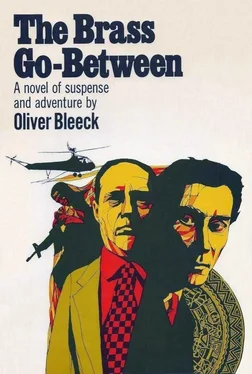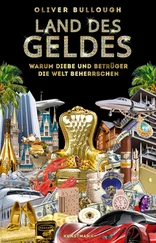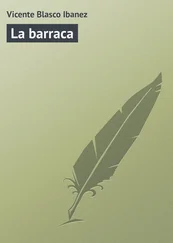Oliver Bleeck - Brass Go-Between
Здесь есть возможность читать онлайн «Oliver Bleeck - Brass Go-Between» весь текст электронной книги совершенно бесплатно (целиком полную версию без сокращений). В некоторых случаях можно слушать аудио, скачать через торрент в формате fb2 и присутствует краткое содержание. Город: New York, Год выпуска: 1969, Издательство: William Morrow, Жанр: Детектив, на английском языке. Описание произведения, (предисловие) а так же отзывы посетителей доступны на портале библиотеки ЛибКат.
- Название:Brass Go-Between
- Автор:
- Издательство:William Morrow
- Жанр:
- Год:1969
- Город:New York
- ISBN:нет данных
- Рейтинг книги:3 / 5. Голосов: 1
-
Избранное:Добавить в избранное
- Отзывы:
-
Ваша оценка:
- 60
- 1
- 2
- 3
- 4
- 5
Brass Go-Between: краткое содержание, описание и аннотация
Предлагаем к чтению аннотацию, описание, краткое содержание или предисловие (зависит от того, что написал сам автор книги «Brass Go-Between»). Если вы не нашли необходимую информацию о книге — напишите в комментариях, мы постараемся отыскать её.
Brass Go-Between — читать онлайн бесплатно полную книгу (весь текст) целиком
Ниже представлен текст книги, разбитый по страницам. Система сохранения места последней прочитанной страницы, позволяет с удобством читать онлайн бесплатно книгу «Brass Go-Between», без необходимости каждый раз заново искать на чём Вы остановились. Поставьте закладку, и сможете в любой момент перейти на страницу, на которой закончили чтение.
Интервал:
Закладка:
“Myron Greene mentioned a meeting,” I said. “But he didn’t mention the time.”
“One o’clock. For lunch, if that’s convenient.”
“It is. Where?”
“Here at the museum. There’ll be the two of us and the three-man executive committee. Any cab driver will know where it is.”
“At one o’clock then,” I said.
“At one,” she said.
After we hung up I read through Myron Greene’s three-page memorandum again, but there was nothing in it that I had missed from previous readings. I had little else to do for the next 45 minutes so I took out my wallet and counted the money. There was a trifle more than $400. I had emerged at 3 A.M. Sunday from the poker session the winner of approximately $500 which was around $500 better than usual. If my mental tally was correct, I was nearly $35 ahead of the game, which had been running now for a little more than three years. My uncanny skill as a card player still seemed no viable substitute for industriousness, thrift, and pluck — character traits that somehow had eluded me over the years.
Because there was still nothing to do and time to waste I went into the bathroom, admired the lime green fixtures, brushed my teeth, and inspected my gums which were receding, a dentist had recently told me, at a normally healthy pace. I wondered what that was: a centimeter a year? Less? Probably more. A little depressed by my inspection and not at all confident that the Coulter Museum served a preluncheon drink, I went down to the lobby and into the bar and ordered a martini. It was half-past noon, but the bar was barely a fourth full. Only the truly thirsty seemed willing to brave the Capital’s noonday sun.
When Amos Woodrow Coulter died unexpectedly in 1964 from infectious hepatitis at the age of 51, unmarried and alone, he left most of his estimated $500 million fortune to several foundations and the Federal government, noting in his will that the government “will probably get it anyway,” but including the carefully drawn provision that the money be used to build a gallery or museum in Washington to house his vast art collection and to acquire “other works of merit, interest, worth, and significance as they appear on the world market.”
Coulter had made his fortune in electronics, and most of the gadgets that his firm patented and manufactured were snapped up by the government to guide its missiles and steer its rockets to the moon and beyond. When not making money, Coulter and his extremely knowledgeable agents toured the world and spent it on art in wholesale lots when possible, on individual works when not. His formal education had been ended by the depression of the thirties when he was a sophomore at Texas Christian University but even then possessed by a love for art in all its forms. There were those who claimed that Amos Coulter never married because he never found a woman who was willing to let him hang her on a wall. In any event, his eye for art more than matched his passion. He made his first purchase, a Modigliani, in 1946 shortly after he made his first million. From then, until the time of his death, he spent lavishly and bought shrewdly on a rising market. When he died, his collection, exclusive of his other holdings and interests, was conservatively valued at $200 million.
Coulter himself designed the museum that was to bear his name and it stood now just off Independence Avenue on several acres of ground formerly occupied by “temporary” World War I buildings that had been hastily thrown up in 1917 and were still in use almost a half century later. An act of Congress in 1965 had donated the land for the museum and, although in existence for only a few years, it was already acknowledged, with a few carping exceptions, as one of the finest in the world. Those who didn’t like it didn’t like the Guggenheim either.
It was an impressive building in a city of impressive buildings. Although only five stories high it still managed to soar a little, and if it didn’t command awe, it at least earned admiration and respect. Built of Italian marble and textured concrete, it covered almost a block and somehow created the atmosphere of a friendly gallery instead of a municipal jail and it seemed to beckon the passer-by to come in and look around. I admired it while the cab made its approach, and when inside a guard informed me that Mrs. Wingo’s office was on the fifth floor and that the elevators were just to my left. On the fifth floor a discreet sign pointed the way to the director’s office and when I walked in a young Negro girl looked up from her typewriter, smiled, and wanted to know if I was Mr. St. Ives. When I said that I was she said that Mrs. Wingo was expecting me.
Mrs. Frances Wingo, director of the Coulter Museum, sat behind a boomerang-shaped desk of inlaid wood that had nothing on it other than a pair of rather hideous African statues about nine inches tall and a telephone console that seemed to have at least three dozen buttons. Behind her, to the east, a window provided a view of the Capitol building which looked no more real than it does in those movies about Washington where it always seems to be just across the street from every man’s office, even if he works in the basement of the Pentagon out in Virginia. It was a large room, nicely carpeted, about the size of that awarded to an under-secretary of State or the majority whip in the House of Representatives. There was even a fireplace at one end with some club chairs and a couch grouped around it. There were a number of paintings on the cork-lined walls and I recognized a Klee and thought it a shame that it was tucked away out of public view.
“I rotate the paintings in here every week, Mr. St. Ives,” said Frances Wingo, the mind reader. “None is kept from public view. Do sit down.”
I sat in something comfortable that was made out of down-stuffed leather and wood. There was no ashtray in sight, but Frances Wingo opened a drawer and placed a blue, oblong ceramic dish in front of me. I decided not to smoke. She was a little over or a little under thirty, and rather tall unless she was sitting on a couple of pillows. She wore a dark brown dress of some nubby weave and that slightly defensive expression that most female executives wear who have reached the top before they are thirty-five. After that, the expression usually hardens into grim resolve. She had cut her dark hair short, perhaps too short, and for a moment I thought that she might be a practicing dyke, but her eyes were too soft and brown and large, although it may have been that she was having trouble with her thyroids. Her nose tipped up slightly and she hadn’t bothered to disguise the freckles that were sprinkled across its bridge. Her mouth was wide, but not too wide, and it was hard to tell whether she wore lipstick. Frances Wingo, I decided, was a long way from being beautiful, but she had a face you could remember with pleasure and it probably looked the same at breakfast as it did over cocktails.
“You come highly recommended,” she said.
“By whom?”
“By your Mr. Greene and by whoever stole the shield.”
“I understand that they asked for me.”
“Not asked,” she said. “Insisted.”
“I’m not sure that I’m flattered.”
She opened a desk drawer and took out a yellow, unsharpened pencil and absently began to tap its eraser against the top of her desk. “Senator Kehoel on our executive committee also had some nice things to say about you.”
“That’s because I wrote some nice things about him,” I said. “A long time ago.”
“Four years ago,” she said, still tapping away with the pencil. “Just before your paper folded. I’m surprised that you’re no longer writing; you had an interesting style.”
“Not enough newspapers to go around; at least not in New York.”
Читать дальшеИнтервал:
Закладка:
Похожие книги на «Brass Go-Between»
Представляем Вашему вниманию похожие книги на «Brass Go-Between» списком для выбора. Мы отобрали схожую по названию и смыслу литературу в надежде предоставить читателям больше вариантов отыскать новые, интересные, ещё непрочитанные произведения.
Обсуждение, отзывы о книге «Brass Go-Between» и просто собственные мнения читателей. Оставьте ваши комментарии, напишите, что Вы думаете о произведении, его смысле или главных героях. Укажите что конкретно понравилось, а что нет, и почему Вы так считаете.












